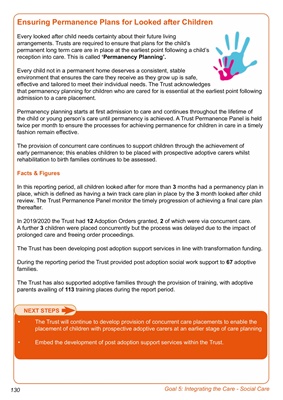
Ensuring Permanence Plans for Looked after Children
Every looked after child needs certainty about their future living
arrangements. Trusts are required to ensure that plans for the child's
permanent long term care are in place at the earliest point following a child's
reception into care. This is called 'Permanency Planning'.
Every child not in a permanent home deserves a consistent, stable
environment that ensures the care they receive as they grow up is safe,
effective and tailored to meet their individual needs. The Trust acknowledges
that permanency planning for children who are cared for is essential at the earliest point following
admission to a care placement.
Permanency planning starts at first admission to care and continues throughout the lifetime of
the child or young person's care until permanency is achieved. A Trust Permanence Panel is held
twice per month to ensure the processes for achieving permanence for children in care in a timely
fashion remain effective.
The provision of concurrent care continues to support children through the achievement of
early permanence; this enables children to be placed with prospective adoptive carers whilst
rehabilitation to birth families continues to be assessed.
Facts & Figures
In this reporting period, all children looked after for more than 3 months had a permanency plan in
place, which is defined as having a twin track care plan in place by the 3 month looked after child
review. The Trust Permanence Panel monitor the timely progression of achieving a final care plan
thereafter.
In 2019/2020 the Trust had 12 Adoption Orders granted, 2 of which were via concurrent care.
A further 3 children were placed concurrently but the process was delayed due to the impact of
prolonged care and freeing order proceedings.
The Trust has been developing post adoption support services in line with transformation funding.
During the reporting period the Trust provided post adoption social work support to 67 adoptive
families.
The Trust has also supported adoptive families through the provision of training, with adoptive
parents availing of 113 training places during the report period.
• The Trust will continue to develop provision of concurrent care placements to enable the
placement of children with prospective adoptive carers at an earlier stage of care planning
• Embed the development of post adoption support services within the Trust.
NEXT STEPS
130 Goal 5: Integrating the Care - Social Care